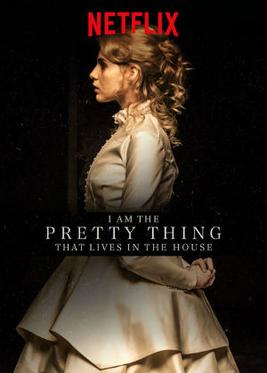I Am the Pretty Thing That Lives in the House
I Am the Pretty Thing That Lives in the House is a 2016 American-Canadian horror film directed and written by Osgood Perkins. The film stars Ruth Wilson as Lily, a live-in nurse who moves into the remote New England mansion owned by her patient, an elderly horror novelist who suffers from dementia. Lily comes to believe that the house is haunted by the protagonist of her patient's most famous book, a witch named Polly who was believed to have lived in the house in the 19th century.
Plot[edit | edit source]
Lily, a timid and nervous nurse, takes a job caring for Iris Blum, a reclusive elderly author who lives in a large, old house. Iris is famous for her horror novel "The Lady in the Walls," which she insists was not a work of fiction but a recounting of the ghostly experiences she had in her own home. As Lily spends more time in the house, she starts experiencing strange occurrences and believes that the house is haunted by the spirit of Polly, a woman who is said to have died in the house many years before and who Iris claims is the real-life inspiration for her novel.
Lily's fear of the house grows as she reads Iris's book and learns the story of Polly, who was accused of witchcraft and died under mysterious circumstances. She hears strange noises, sees ghostly apparitions, and feels an increasingly oppressive presence in the house. Despite her fear, Lily is determined to uncover the truth about the house, Iris, and the ghost of Polly.
Cast[edit | edit source]
- Ruth Wilson as Lily
- Paula Prentiss as Iris Blum
- Bob Balaban as Mr. Waxcap
- Lucy Boynton as Polly Parsons
Production[edit | edit source]
The film was directed and written by Osgood Perkins, son of the late actor Anthony Perkins. It was produced by Zed Filmworks and Paris Film Inc., with filming taking place primarily in Ontario, Canada. Perkins aimed to create a horror film that relies more on atmosphere and suspense rather than graphic violence or jump scares. The film's slow-burning narrative and emphasis on mood over action are reflective of Perkins's stylistic choices.
Release[edit | edit source]
I Am the Pretty Thing That Lives in the House premiered at the Toronto International Film Festival (TIFF) on September 10, 2016. It was later released on Netflix on October 28, 2016, just in time for Halloween. The film received mixed reviews from critics, with some praising its atmospheric tension and Ruth Wilson's performance, while others criticized its slow pace and lack of traditional horror elements.
Reception[edit | edit source]
Critics were divided on I Am the Pretty Thing That Lives in the House. Some appreciated the film's atmospheric tension, eerie storytelling, and strong performances, particularly from Ruth Wilson. Others found the film's slow pace and minimalistic approach to horror less engaging. Despite the mixed reviews, the film has been discussed for its contribution to the genre, particularly in terms of its focus on psychological horror and its exploration of themes such as isolation, mortality, and the presence of the past.
Themes[edit | edit source]
The film explores themes of isolation, the passage of time, and the thin veil between life and death. It delves into the psychological impact of living in a space where the past is palpably present and potentially malevolent. The narrative also touches on the idea of stories—how they are told, who tells them, and the power they hold over both the teller and the listener.
Search WikiMD
Ad.Tired of being Overweight? Try W8MD's physician weight loss program.
Semaglutide (Ozempic / Wegovy and Tirzepatide (Mounjaro / Zepbound) available.
Advertise on WikiMD
|
WikiMD's Wellness Encyclopedia |
| Let Food Be Thy Medicine Medicine Thy Food - Hippocrates |
Translate this page: - East Asian
中文,
日本,
한국어,
South Asian
हिन्दी,
தமிழ்,
తెలుగు,
Urdu,
ಕನ್ನಡ,
Southeast Asian
Indonesian,
Vietnamese,
Thai,
မြန်မာဘာသာ,
বাংলা
European
español,
Deutsch,
français,
Greek,
português do Brasil,
polski,
română,
русский,
Nederlands,
norsk,
svenska,
suomi,
Italian
Middle Eastern & African
عربى,
Turkish,
Persian,
Hebrew,
Afrikaans,
isiZulu,
Kiswahili,
Other
Bulgarian,
Hungarian,
Czech,
Swedish,
മലയാളം,
मराठी,
ਪੰਜਾਬੀ,
ગુજરાતી,
Portuguese,
Ukrainian
Medical Disclaimer: WikiMD is not a substitute for professional medical advice. The information on WikiMD is provided as an information resource only, may be incorrect, outdated or misleading, and is not to be used or relied on for any diagnostic or treatment purposes. Please consult your health care provider before making any healthcare decisions or for guidance about a specific medical condition. WikiMD expressly disclaims responsibility, and shall have no liability, for any damages, loss, injury, or liability whatsoever suffered as a result of your reliance on the information contained in this site. By visiting this site you agree to the foregoing terms and conditions, which may from time to time be changed or supplemented by WikiMD. If you do not agree to the foregoing terms and conditions, you should not enter or use this site. See full disclaimer.
Credits:Most images are courtesy of Wikimedia commons, and templates Wikipedia, licensed under CC BY SA or similar.
Contributors: Prab R. Tumpati, MD

